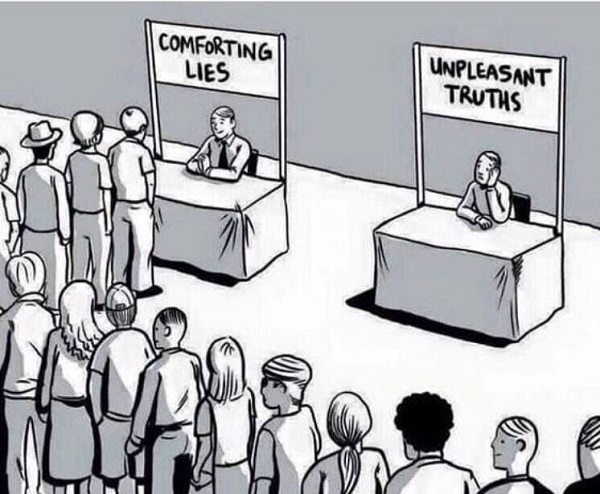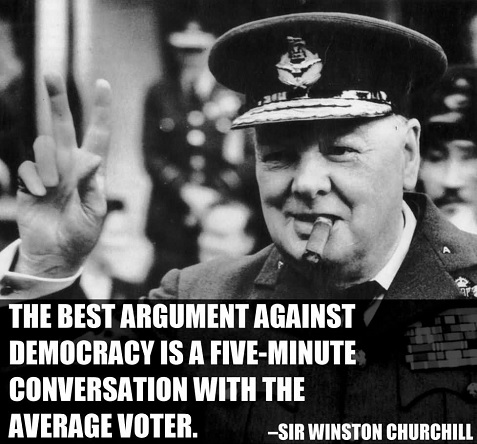
[Source]
Let's Adore Jesus-Eucharist! | Home >> Politics

[Source]
"Democracy" has to be one of the most popular and venerated ideas in our society today. But what exactly does the word "democracy" mean? Many people who should know more than me, actually spread confusion about the nature of democracy. So here is my best attempt at some preliminary groundwork. I'll try to warn you against three difficulties in defining the word "democracy", and three common errors in many real-life governments.
Let's start with the three difficulties. If we want to have intelligent discussions about democracy, we have to define the word "democracy". But before we look for a definition of "democracy", we have to understand a bit how definitions work. There are at least three difficulties related to definitions: one related to the will, one related to the reason, and one related to the reality under study.
In our quest for a definition of "democracy", we need to remember that human wills often tend toward evil. In other words, Original Sin often causes bad uses of the dictionary. For example, a salesman will stick a label saying "High Quality!" on a product, even though the product is of low quality. Or a pharmaceutical company will write "Perfectly Safe!" on a bottle of pills, even though the appropriate word in the dictionary is "Imperfectly", etc.
If a word is associated with good feelings, some bad people will try to use that word to fool others. This of course applies to one of the most "feel-good" words today: "democracy". Many corrupt politicians stick the label "democracy" on things that are not democratic at all. So of course, we must not try to find a contorted definition of "democracy" that would cover these cases of verbal manipulation!
The second difficulty in finding good definitions is that our reason does not use words to signify things. Our reason uses words to signify concepts, which in turn signify things.

Let's take an example. Suppose you find a caveman frozen in ice, and manage to thaw him back to life. Then you take him to Cape Canaveral, point your finger at a space shuttle rocketing into space, and repeat several times: "Space Shuttle"! You will have produced an association in this caveman's head between the words "space shuttle", and the actual space shuttle, through a concept. If we could open the caveman's head, and examine what exactly his concept of space shuttle looked like, we might find: "Big noisy bird, flying straight up, with lots of smoke like when burning wet firewood". Now if we could open the head of one of the NASA engineers, and look at the contents of his concept of space shuttle, we would probably find a far more detailed and precise concept: "Manned low Earth-orbit vehicle, launched from stationary ground position, propelled by combination of bi-liquid fuel (liquid hydrogen and oxygen) turbo-pump oriented rocket engines and two solid-fuel boosters, protected by ceramic tiles during reentry into atmosphere, and gliding unpowered back to airstrip landing."
Our reason works that way, whether for space shuttles, or democracies. We use concepts, and our concepts can be wrong, or ambiguous, or incomplete. And I'm excluding the case of lying here: even a very honest and hard-working caveman can have imperfect concepts. So next time you hear some citizen pointing to his or her country and saying: "Democracy!", even though it's not really democratic, think about that caveman pointing to a silly fireworks rocket and saying "space shuttle"!
The third difficulty in finding good definitions is that the very thing we are trying to define is often a "composed being". For example, a car is a "composed being": it has wheels, a motor, a chassis, windows, seats, etc. That's easy, but when does a car stop being a car? How badly does it have to be "decomposed" before we stop calling it a "car"? If the windshield wipers are gone, is it still a "car"? Yes, I'd say. But what if one wheel is missing? What if all the wheels are missing? What if it doesn't have wheels or a motor?
This problem also occurs when we try to define "democracy". Is it still a democracy if only hemen can vote? Is it still a democracy if the king can sometimes overrule the decisions of the members of Parliament, even though most of the time he doesn't give a hoot and concentrates on his royal golf playing?
Notice that this difficulty in defining a word is caused by the very nature of the thing being defined. Even if you assume we all have good wills and perfect concepts, we can still have problems deciding when to stop using a word. Notice also that this doesn't mean that "our senses deceive us" or that "we cannot know truth". On the contrary, we clearly see and know that this "thing" doesn't have wheels or a motor, which is why we might not be sure whether to still call it a "car".
We've seen three difficulties related to definitions. Now, let's look at three common errors in many real-life governments: disconnection from Natural Law, incompetence of voters, and lack of moral virtue in leaders and followers.
In a way, real governments have many similarities with how we "govern ourselves". For example, suppose you are hungry. If you don't eat, you will be unhappy. By your very nature, you need to eat, and not just anything (i.e. what feeds you is determined by Natural Law). Then, you need brains to make a plan about how to find food (i.e. competence to "vote" for the right plan), and finally you need to give an order to your right hand, and it has to obey: "Right hand! Open that fridge, and reach for the fresh vegetables" (i.e. the moral virtue of leaders and followers). Let's now look at each one of those three aspects in more detail.
Because of Natural Law, we can't satisfy our hunger by eating rocks or nails. (See among others "What Is Morality?") This is the same for government. A good government must guide the people toward the Common Good, and away from disasters like a national bankruptcy, or a destroyed environment, or a genocide, etc. The Common Good is what is good for all citizens, and "good" means "appropriate to our nature", or in other words "conforming to Natural Law".
When a government (whether it's a monarchy, an aristocracy or a democracy) "disconnects" itself from Natural Law, it basically ceases to be a real government. There are even different words to designate such montrosities: monarchy becomes "tyranny", aristocracy becomes "oligarchy", and democracy becomes "demagogy". And since a government governs the people using laws and sanctions, a "law" that seeks something else than the Common Good is no longer really a law. In other words, an unjust "law" is not a law. (See among others "Bill C-666".)
One of the common errors these days, concerning democracy, is this idea that "Quod principi placuit legis vigorem habet", i.e. "what pleases the ruler has the force of law". But whether the "ruler" is one king, or all the citizens, it remains that a "law" is not just something that pleases the ruler. It has to conform to Natural Law, otherwise it's just an optical illusion. (Other similar expressions to designate the same error are "the tyranny of the majority", or "the dictatorship of relativism", etc.)
The second common error these days, is this idea that putting many fools in a room will yield the work of a genius, in other words, the idea that a "democracy" is when every warm body has a right to vote.
It's not enough to know fresh fruits and vegetables are good for you (i.e. the goal of your action, determined by Natural Law), you need the competence to select the proper means to reach that goal. In other words, you need the technical knowledge to either grow your food, or to get a good job, earn money, then go to the grocery store.
It's the same for a government: the ruler must know which means will lead to the Common Good. Whether the ruler is only one citizen (a monarchy), or a few of them (an aristocracy), or all of them (a democracy) doesn't change the requirement for competence. If all citizens vote that the best means to national happiness and prosperity is for the governent to supply them with free beer every day, by sinking their grandchildren into debt in order to buy it, then the Common Good will not be attained.
Let's talk about a situation I'm familiar with: the Province of Quebec. Here, you have a "right" to vote, even if you get thrown in jail because you have a total lack of judgement. Imagine! Society officially recognises that you have no judgment (because you killed your grandmother to get the inheritance money, or you ran over three people, while driving around buck naked and drunk in your car, or some other stupidity). Then society says: "Hey, now we are going to let you vote, i.e. perform the act which requires the greatest amount of judgment, since the fate of our Nation depends on it". Another example is voting by the mentally incompetent. You can be in an old folks home, and so confused that you don't know how to tie your shoes or go to the bathroom anymore, but the law says the head nurse next to your bed can make you put an "X" on some piece of paper!
Of course, I have nothing against rehabilitation of criminals, or respect for the elderly and the handicapped. Also, I of course agree that each adult citizen, having a minimum of intelligence and moral virtue, can be educated to be able to get informed and to judge on Common Good issues. Moreover, ceteris paribus, it's preferable that: "the rulers [...] be chosen from the people, and the people have the right to choose their rulers" (ex popularibus possunt eligi principes, et ad populum pertinet electio principum) [Saint THOMAS, Somme Théologique, Ia-IIae, q. 105, a. 1].
On the other hand, there is a disturbing trend when voting becomes more like a lollipop handed out to every single child to keep them quiet, while the real decisions are made elsewhere by other people. It is disturbing when the government constantly repeats we live in a "democracy", while simultaneously not making efforts to give all citizens the education necessary to make a real democracy work (See also "How To Kill Your Democracy Piecemeal".)

The best argument against Democracy
is a five-minute conversation
with the average voter.
[Source]
There is an old saying that "power corrupts". Some people misinterpret that saying, and claim that power is inherently evil. That is not true. Think about a fire chief barking orders to his men: "Jack, connect the fire hose to the fire hydrant! Bob, get the ladder and put it under the window where that woman and her children are screaming for help! Tom, go put on your fire-resistant coat and boots, and your oxygen tank; you'll be going up the ladder to carry them down, because you're the strongest!" Here we have a plain case of authority: the leader gives orders, and the followers obey. Without this authority, the woman and her children would die. Nothing inherently evil here.
Men, by Natural Law, cannot work toward the Common Good without an authority guiding them. This authority can be misguided (by enacting unjust "laws", for example), or usurped (for example when a corrupt military junta expels a democratically-elected parliament and takes power), or mocked (for example, when a mob of racists proceeds to lynch a black man, even though the police chief screams that this is a crime and orders everybody to stop). But political authority in itself is not evil.
Authority is not evil in itself, but citizens can certainly lack moral virtue, whether they are plain voters or elected government leaders. The seven capital sins (pride, greed, envy, anger, impurity, gluttony, sloth [CCC, #1866]) can destroy any democracy, anytime.
What Is Democracy? I'm still studying good books on that topic, and I certainly recommend that you do the same. In the meantime, I vote that we keep in mind the above-mentioned three difficulties related to definitions, and strive to avoid the three common errors of many governments.
Let's Adore Jesus-Eucharist! | Home >> Politics